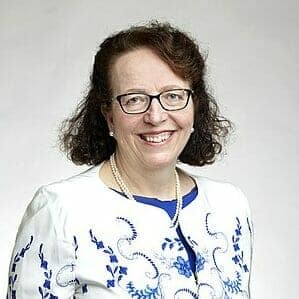Ingrid Scheffer, AO MB BS PhD FRACP FAHMS FAA
University of Melbourne
Laureate Professor Ingrid Scheffer’s work has resulted in a major paradigm shift in our understanding of the epilepsies, highlighting the importance of genetic causes. Her work on epilepsy syndromes and classification over thirty years has framed clinical practice. Her collaborative group discovered the first gene for epilepsy in 1995, and has been one of the leading groups in epilepsy gene discovery since. Gene identification has provided insights into understanding why seizures occur, and paved the way for development of precision medicines that target the underlying cause.
Professor Scheffer is Chair of Paediatric Neurology at The University of Melbourne and Senior Principal Research Fellow at the Florey Institute of Neuroscience and Mental Health and Senior Fellow at the Murdoch Children’s Research Institute. She is the Director of the Children’s Epilepsy Program at Austin Health and a paediatric neurologist at the Royal Children’s Hospital in Melbourne, Australia.
Ingrid and her colleagues have described many new epilepsy syndromes beginning in infancy, childhood and adult life. Her work has meant that children and adults with sodium channel disorders such as Dravet syndrome and related epilepsies are diagnosed earlier and treated appropriately which improves their long term outcomes. Her team were the first to study many of the morbidities seen in Dravet syndrome such as the gait decline that often emerges in adolescence, the sleep problems in 75% of individuals and the range of issues that arise in adult life.
Professor Scheffer has been the recipient of many international and national awards including the 2007 American Epilepsy Society Clinical Research Recognition Award, the 2012 L’Oréal-UNESCO Laureate for Women in Science for the Asia-Pacific Region, 2013 International League Against Epilepsy (ILAE) Ambassador for Epilepsy and the 2024 Epilepsy Society of Australia Peter Bladin Award. She has served the ILAE in many capacities and held the Chair of the ILAE Commission for Classification and Terminology from 2009 until 2013 and continues to develop new concepts for the ILAE on epilepsy syndrome classification. In 2014, she was elected a fellow of the Australian Academy of Science and an Officer of the Order of Australia (AO) in the Queen’s Birthday Honours List, for distinguished service to medicine in the field of paediatric neurology as a clinician, academic and mentor, and to research into the identification of epilepsy syndromes and genes. Professor Scheffer was awarded the Australian Prime Minister’s Prize for Science with Professor Samuel Berkovic in 2014. In 2018, Ingrid was elected a Fellow of the Royal Society of London.
In 2019, she was elected President of the Australian Academy of Health and Medical Sciences for three years, following six years as its founding Vice President. She founded and chaired the Mentorship Committee for six years. She also served for six years on the National Health and Medical Research Council of Australia. She mentors and supervisors fellows from many disciplines in Australia and internationally. She enormously enjoys collaborating with colleagues around the world and working with families to improve the outcomes of people living with epilepsy.

